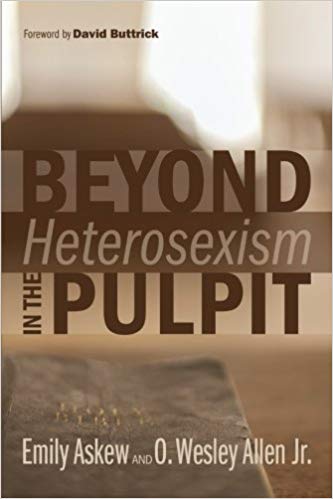Beyond Heterosexism in the Pulpit by Emily Askew and O. Wesley Allen
by Hilary Marchbanks on Thursday, August 4, 2016

Reviewed by Rev. Hilary Marchbanks
Pastors in the mainline church are surrounded by resources that reassure, guide, and focus on heteronormative lives. Our liturgy, exegesis, and interpretation of the biblical witness often cater to and follow the pattern of the heteronormative family.
As a pastor in a city thriving with young couples, I often provide pre-marital counseling. When recently working through a relationship survey and assessment with my first gay couple in pre-marital counseling, I asked them to let me know if there was any heteronormative language in the assessment (the assessment’s headquarters had assured me there was no gendered language before I ordered it). As I worked through the questions with the couple, it was true that we did not see gendered language. However, we did see the “normal” examples in the assessment as only pertinent to hetero relationships. Unfortunately, this reality, which has permeated all aspects of the church, is found throughout our traditional Christian resources. Straight, mainline pastors are swimming in it — in an almost universal way — and may not be able to see it.
As leaders, preachers need to recognize what is said, what is not expressed, and to what we should bear witness. That’s exactly where Emily Askew and O. Wesley Allen Jr. start in Beyond Heterosexism in the Pulpit.
Written from two different perspectives — male and female, straight and lesbian, United Methodist and Christian Church (Disciples of Christ) – this thoroughly insightful book does not begin with “clobber passages” that desperately seek to convince you to be open and affirming. They begin by asking you to pick up this book and issue this challenge to yourself: take time to really look at the “polite” passages in our wedding liturgy, sermons, and Christian culture. Although these well-mannered traditions in our Word and Sacrament may not blatantly harm, they do fail to celebrate and often even include gay and lesbian persons.
Beyond Heterosexism shows us the healthy balance between prophesy and pastoral care, guiding us to care for gay and lesbian people in our congregations in a smart and caring way. The book addresses the ways we all can be in unity by listing helpful self-examination questions that resonate with the ways we are still not yet hospitable and affirming, even to marginalized groups outside of homosexuality.
Today, it is important as ever for pastors to be both pastoral to all and affirming of all in a world which very much needs the Gospel. We need to share, “a positive new word about God’s salvific actions toward all people and not simply find in our sermons the absence of punishment for homosexuality.” (28) Thankfully, Beyond Heterosexism gives us the tools to do so.
***
Hilary Marchbanks is Associate Pastor at Saint John’s United Methodist Church in Austin. Before vocational ministry, Hilary was a public relations professional. She is a graduate of Baylor University and is completing studies at Austin Presbyterian Theological Seminary. She lives in Austin with her husband and two young sons.
